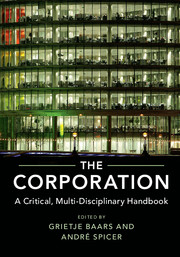Book contents
- Frontmatter
- Contents
- List of Contributors
- Acknowledgements
- Introduction: Why the Corporation?
- PART I DISCIPLINARY OVERVIEWS
- PART II INTERDISCIPLINARY THEMATIC CHAPTERS
- 1 The Evolution of the Corporate Form
- a Between Company and State: The Dutch East and West India Companies as Brokers between War and Profit
- b Early Modern Business Projects and a Forgotten History of Corporate Social Responsibility
- c Finance and the Origins of Modern Company Law
- 2 The Multinational Corporate Group
- 3 The Financialization of the Corporation
- 4 Corporate Value Chains
- 5 Corporate Citizenship
- 6 The Corporation and Crime
- 7 The Corporation and Ideology
- 8 Corporation and Communities
- 9 Corporations and Resistance
- 10 Alternatives to the Corporation
- Index
- References
b - Early Modern Business Projects and a Forgotten History of Corporate Social Responsibility
from 1 - The Evolution of the Corporate Form
Published online by Cambridge University Press: 31 March 2017
- Frontmatter
- Contents
- List of Contributors
- Acknowledgements
- Introduction: Why the Corporation?
- PART I DISCIPLINARY OVERVIEWS
- PART II INTERDISCIPLINARY THEMATIC CHAPTERS
- 1 The Evolution of the Corporate Form
- a Between Company and State: The Dutch East and West India Companies as Brokers between War and Profit
- b Early Modern Business Projects and a Forgotten History of Corporate Social Responsibility
- c Finance and the Origins of Modern Company Law
- 2 The Multinational Corporate Group
- 3 The Financialization of the Corporation
- 4 Corporate Value Chains
- 5 Corporate Citizenship
- 6 The Corporation and Crime
- 7 The Corporation and Ideology
- 8 Corporation and Communities
- 9 Corporations and Resistance
- 10 Alternatives to the Corporation
- Index
- References
Summary
He in Civil Life whose Thoughts turn upon Schemes which may be of general Benefit, without further Reflection, is call'd a Projector.
Richard Steele, June, 1710 (Tatler, 1987)I hope I shall give Convincing Reasons & Clear demonstration for what I shall in future Assert, That it may appear, All Projectors are not Imposters[.]
Samuel Weale to the Society for the Propagation of the Gospel, 18 October 1706 (Rawlinson MS)The other contributions in this section provide the reader with much useful information about corporations and their dynamism from robust historical perspectives. This chapter offers something different. For doubts about corporations and enterprises were long ago, as now, rife in England even before the advent of mass literacy and financial journalism in the nineteenth century. Sir Richard Steele and the more humble Samuel Weale were painfully aware of this public scepticism. While remembered chiefly as a contributor to the two literary enterprises, Tatler and Spectator, Steele was also known during his lifetime as a promoter of the ‘fish-pool’, an invention for transporting fish alive; Weale was appealing to the Society for the Propagation of the Gospel after having gone bankrupt and kept in a debtors’ prison due to his involvement in several short-lived companies. As their frustrations reveal, such promoters of corporations were derided as being little better than imposters and mountebanks. Note that promoters were dubbed ‘projectors’ – a term perhaps unfamiliar to most modern readers. In the absence of economic and management studies as intellectual disciplines, early modern commentators drew upon concepts like ‘projector’ to make sense of corporations and their ambitions (or pretensions) to achieve ‘general Benefit’, as Steele put it.
In this chapter, then, I want to broaden the keywords of this Handbook to include the early modern notions of the ‘project’, and its promoter the ‘projector’, in order to survey a forgotten pre-history of corporate social responsibility (CSR). Business ethics, social entrepreneurship and CSR have become important parts of business and management studies; they are among key agendas for non-governmental organisations, think tanks and political institutions concerned with corporations and their role in the transforming of society in which we now find ourselves. Moral justification is also an important theme in a branch of French sociology concerned with contemporary capitalism.
- Type
- Chapter
- Information
- The CorporationA Critical, Multi-Disciplinary Handbook, pp. 226 - 237Publisher: Cambridge University PressPrint publication year: 2017



